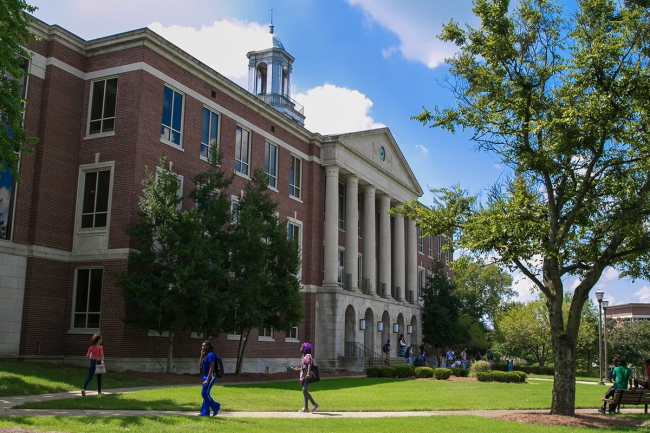You have /5 articles left.
Sign up for a free account or log in.

Tennessee lawmakers overhauled Tennessee State University's board.
Tennessee State University
Supporters of Tennessee State University have been on edge since Governor Bill Lee swiftly signed legislation, advanced by Republican state lawmakers, to vacate the university’s Board of Trustees.
Republicans argued that the historically Black land-grant university is financially struggling and needs fresh leadership to better support its students. The university’s advocates pushed back on that narrative and noted the institution has been chronically underfunded and needs more state support, not meddling. Some see this move as an egregious example of a larger history of harmful state policies toward HBCUs nationally and worry other institutions might face similar overhauls amid growing political opposition among Republican lawmakers to diversity, equity and inclusion work in some states.
“TSU and its activities are always under a microscope,” said Learotha Williams, professor of African American and public history and coordinator of the North Nashville Heritage Project at Tennessee State University. “The places where it stumbles are magnified, the instances where it shines are minimized, marginalized, or just ignored. That has been consistent throughout the history of the states throughout TSU’s history.”
Governor Lee announced he had selected eight replacements for the board members shortly after the legislation passed last month in the Tennessee House of Representatives. All of the new trustees are alumni of the university.
“Tennessee State University is a remarkable institution and my administration, in partnership with the General Assembly, is committed to ensuring students are being served,” Lee said in a statement. “I’m pleased to appoint these highly qualified individuals who will work alongside administrators and students to further secure TSU’s place as a leading institution.”
Republican lawmakers had been trying to replace Tennessee State’s board since the university was slammed in a state audit last year for greatly increasing enrollment by expanding scholarships without having enough student housing to accommodate the influx, among other issues. The state comptroller’s report also called for a change of leadership at the institution. A $2 million external forensic audit commissioned by state lawmakers, released last month, found no fraud or malfeasance at the university but raised similar concerns, including about a 250 percent increase in scholarships.
Opponents of the move, including university officials, students and professors, have pointed out that Tennessee underfunded the university by $2.1 billion over three decades, according to recent data provided by the U.S. Education Department and the Department of Agriculture. The departments sent letters last year to all states that owed money to their historically Black land-grant institutions informing them of the amounts owed. Tennessee was the worst offender, based on the data.
An earlier 2021 report by the Tennessee Office of Legislative Budget Analysis found the state owed the institution between $150 million and $544 million over a 60-year period. The state appropriated $250 million to Tennessee State for infrastructure after the report came out.
State lawmakers “owe us billions of dollars over the last 30 some odd years,” Williams said. “Now we're in a position where discussions of money and audits flood the airwaves.” But he believes whatever financial mishandling may have happened at Tennessee State “pales in comparison” to the effects of its underfunding.
What's more, observers predicted years ago that the university might not fare well under a 2016 plan that stripped the Tennessee Board of Regents of its oversight of six public universities, including Tennessee State, and gave those institutions their own governing boards. Critics said that plan would benefit "institutions with strong power bases" but hurt Tennessee State.
Williams is keeping an open mind about the new board, but he worries its members won’t be trusted by the campus community and that, as appointees under the current state government, they may be coming into their roles under pressure not to push for the funding he believes Tennessee State is owed.
Representative Ryan Williams, a Republican, told The Tennessean that “the challenges are dire” at the institution and state lawmakers want to give more funding “but we have to have assurances that future investment, or that remedy to this problem, is going to be well taken care of.”
Representative Justin Pearson, a Democrat, sees things differently. “Tennessee State University was denied those resources, and because they were denied the resources, there were problems that occurred,” he told The Tennessean. “But instead of us rectifying the problems that we created through racist policies by underfunding Tennessee State University, we’re now advocating to vacate their board.”
Supporters of Tennessee State University took part in a press conference held by students with local civil rights groups last week at the state capitol in which they expressed their disappointment at the decision and plans to continue pressing for funds owed. Signs held by the crowd read “WE DEMAND FULLY FUNDED HBCUS.”
Shaun Wimberly Jr., a former student trustee who was ousted along with the other board members, said at the press conference that he appreciates that the new board is made up of Tennessee State alumni but lamented that “we’ve allowed others to determine our path …”
“Now the fight to prevent the state overreach for the Board of Trustees has been lost,” he said. “But I’m hopeful for the future of our university with new leadership in place … We have a bigger battle ahead of us, which is the fight for equitable funding.”
The National Picture
Robert Palmer, professor and chair of the Department of Educational Leadership and Policy Studies at Howard University, said the move to vacate the board was surprisingly drastic though not entirely unexpected against the backdrop of the history of HBCUs.
“We see it all over,” Palmer said. “HBCUs have been historically, even presently, systematically underfunded compared to their predominantly white institution counterparts” across the country, and then state lawmakers turn around and blame HBCUs for financial problems.
The data publicized by the Education and Agriculture Departments found, for example, that 16 of the country’s 19 historically Black land-grant universities have been underfunded by their states by a total of about $13 billion. These gaps have led to lawsuits in some states.
Palmer added that HBCUs are also sometimes penalized in performance-based funding models that allocate some funding based on graduation rates because HBCUs disproportionately admit “students who are academically underprepared, who are first-generation college students,” or “diamonds in the rough.”
He sees this as another example of how politicians who “don’t understand the mission” of HBCUs tend to promote policies that “put them in positions so they can fail,” he said.
He worries that these kinds of board overhauls could happen to other HBCUs in the future, particularly at a time when some states have passed a slew of laws seeking to limit diversity, equity and inclusion efforts and the teaching of African American history.
“If there isn’t any pushback, if HBCU leaders do not … make enough noise, I can see this happening in other conservative states,” Palmer said.
The replacement of Tennessee State University’s board comes two years after the Tennessee Divisive Concepts Act took effect. The law prohibits public education institutions from penalizing an employee or student for espousing views counter to “divisive concepts,” which include the idea that “an individual, by virtue of the individual’s race or sex, bears responsibility for actions committed in the past by other members of the same race or sex” or that the U.S. is “fundamentally or irredeemably racist or sexist.” Students and employees can report violators of the law for investigation.
Williams believes such legislation and what’s happening at Tennessee State are interconnected.
“The state has been outrageously anti-Black in just about everything when it comes to education and making it more difficult to even teach African American history,” he said. “All of a sudden, they’re acting in its best interest? I find that hard to believe.”
He noted that the decision to vacate the board seemed to draw on “every racist trope that I’ve ever studied” including “the idea that Black folks are bad with money, they are extravagant” or they’re “intellectually” less capable of running their institutions.
Seeing the board overhaul as separate from broader anti-DEI trends in the state and country “would be like, it’s storming outside and then you look up and see that your roof is leaking and saying, ‘Well, this leaky roof isn’t related to the storm …’” he said.
He added that plenty of predominantly white institutions have their own financial troubles and could find themselves similarly picked on, but they’re not being scrutinized in the same way.
“If I was a president, especially of one of our sister institutions, I would be very wary about what I see going on here,” he added.





